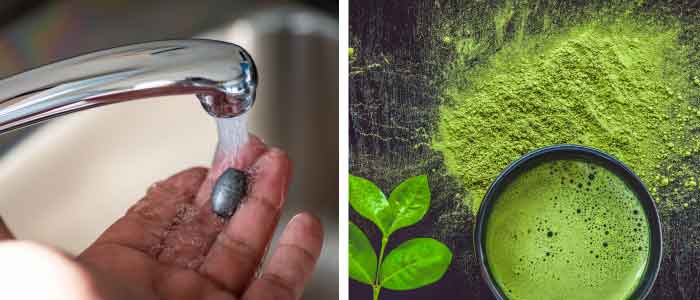There you are, curled up on your favorite chair, savoring the serene moments of your morning ritual with a cup of vibrant green matcha. All is calm, all is bright until… BOOM! You stumble upon a headline screaming “Lead in Matcha?!”
As if the world wasn’t crazy enough, right? Now, you’re left contemplating whether your beloved green elixir could actually be, well, poisoning you. Scary thought, huh? But before you let your heart sink to your matcha-splashed socks, allow me to intervene.
Welcome to the great matcha investigation, my dear tea aficionados. Together, we’ll debunk myths, sift fact from fiction, and get to the bottom of this alarming headline. Are these claims a baseless whisper in the wind, or is there more than meets the eye? Grab another cup of matcha (yes, it’s still safe to drink for now), and let’s spill the tea on this intriguing mystery!
Key Takeaways
- Lead in matcha? More like a frightful fable than a factual fear.
- Consumer Labs, our matcha mystery solvers, found scant traces of lead in popular matcha brands. (Talk about a plot twist!)
- Green tea leaves might dabble with lead, but they’re hardly the lead villains in our saga. The lead content that reaches your cup? Practically non-existent. (Cue the sighs of relief!)
- Last, but certainly not least, remember, we at Ujiha are your vigilant matcha guardians. Our HACCP certification and multitude of safety checks ensure your matcha is as wholesome as it is heavenly.
The Buzz about Lead in Matcha: What’s It All About?
Tea-lovers and conspiracy theorists unite! We’re about to delve into a matcha mystery that has caused more of a stir than the Queen of England forgetting to extend her pinky while sipping her afternoon tea. Yes, we’re talking about the infamous rumors of lead contamination in our sacred matcha. Shocking, isn’t it? But don’t pour your cup of matcha down the drain just yet!
You might be wondering, “How in the world did lead become a party-crasher in my morning matcha routine?” Well, it’s a tale as old as time… or as old as pollution, to be more precise. You see, tea plants have a tendency to absorb lead from the environment, especially if grown in areas with heavy industrial pollution or the use of leaded gasoline.
So does this mean your cherished matcha latte is a ticking time bomb of lead toxicity? Before we let our imaginations run wilder than a caffeine-fueled monkey, let’s spill some science into this tempest in a teacup. Are you ready? On to the next chapter of our matcha investigation!
Consumer Labs to the Rescue: Investigating Lead in Matcha
Cue the dramatic music. It’s time to dive into the science sleuthing that would make Sherlock Holmes himself proud. Enter stage right: Consumer Labs, our matcha detective for this suspense-filled tea tale.
This team of intrepid investigators carried out a comprehensive analysis on a host of popular matcha brands. And let’s just say, their findings would turn any lead-rumor-spreading scaremonger as green as a cup of our favourite powdered tea.
Here’s the plot twist worthy of a detective novel – Consumer Labs found little to no traces of lead in their matcha samples. It’s as if the villainous lead we’ve been chasing was nothing more than a shadow, a specter of hearsay, just a puff of smoke in our steaming hot matcha latte.
To quote our trusty gumshoes at Consumer Labs,
Although green tea leaves can accumulate toxic lead, none of the products were found to provide significant amounts of lead.
By: Green Tea Review: Tea Bags, Loose Tea, Matcha Powders, and Supplements, Consumer Labs
So it appears that our matcha is as clean as a hound’s tooth.
And just like that, the case seems to be coming to a close. But, is it really the end? Let’s brew over this a little more, shall we? On to the next section, my matcha-loving accomplices!
Lead in Green Tea Leaves: A Not So Scary Tale
It’s time to turn a new leaf in our lead saga. You see, there’s been a wee bit of a misunderstanding that’s been swirling around like a spoon in a matcha bowl.
Yes, it’s true that green tea leaves have the ability to accumulate lead. But before you spit out your matcha latte and swear off green tea forever, let’s set the record straight. Like that old game of telephone from our childhood, the message got a little warped along the way.
Here’s the tea: Just because these leaves can accumulate lead, doesn’t mean they’re moonlighting as toxic waste. It’s like assuming that just because you can hold a gallon of ice cream, you’re going to eat it all in one sitting. (And if you do, no judgement here. We’ve all had those days.)
The important thing to remember is that this potential for lead accumulation doesn’t translate into significant lead amounts in your beloved matcha. So, while there may be a trace of truth in the tales of lead-laden leaves, it’s nothing more than a microscopic dot in our large, beautiful, green world of matcha.
So sit back, take a sip of your lead-free matcha, and chuckle at this unfortunate misunderstanding that’s been put to rest. Now, onto our last chapter in this matcha mystery.
Conclusion: Putting the Lid on Lead in Matcha
Well, there you have it. We’ve sipped our way through the swirling rumors, steeped ourselves in research, and whisked away the fog of fear. And what did we find at the bottom of our matcha bowl? A heap of comforting facts and a dash of hilarious misunderstanding.
Lead in your matcha? Scary as a kitten in a teacup. Turns out, our matcha obsession isn’t slowly turning us into lead-filled robots, contrary to those internet trolls. You can now sip your vibrant green lattes, whip up those fluffy matcha pancakes, and indulge in those refreshing iced matcha smoothies without the pesky shadow of lead looming over you.
So, raise your matcha-filled chawans (bowls) high and toast to lead-free matcha indulgence! But before we sign off, there’s one last nugget of reassurance we’d like to leave you with.
Here at Ujiha, we’re as obsessed with safety as we are with matcha. We wear our HACCP certification with pride and can boast of a pantry full of certificates. Organic Certification? Check. Certificate of Analysis (COA)? Check. Certificate of Origin (COO)? Check. Radiation Tests? Triple Check. Rest assured, all our matcha products pass the safety test with flying (green) colors.
So, keep calm and matcha on, dear friends. And remember, at Ujiha, your health, wellness, and trusty matcha fix are always our top priority.


